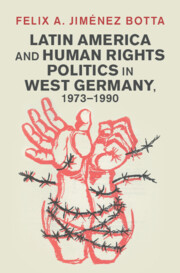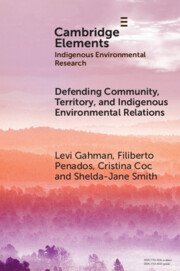Refine search
Actions for selected content:
314 results
7 - “Popular Sovereignty” and the Declaration of Independence
-
-
- Book:
- The Cambridge Companion to the Declaration of Independence
- Print publication:
- 22 January 2026, pp 90-108
-
- Chapter
- Export citation
2 - Self-Determination through Regional Authority
-
- Book:
- New Regional Authorities
- Published online:
- 17 December 2025
- Print publication:
- 08 January 2026, pp 33-61
-
- Chapter
- Export citation
1 - Changing Approaches to Interference in the Global South
-
- Book:
- New Regional Authorities
- Published online:
- 17 December 2025
- Print publication:
- 08 January 2026, pp 1-32
-
- Chapter
- Export citation
7 - Regional Authority and Self-Determination in International Politics
-
- Book:
- New Regional Authorities
- Published online:
- 17 December 2025
- Print publication:
- 08 January 2026, pp 170-184
-
- Chapter
- Export citation
3 - The Imposition of Human Rights Enforcement
-
- Book:
- New Regional Authorities
- Published online:
- 17 December 2025
- Print publication:
- 08 January 2026, pp 62-87
-
- Chapter
- Export citation

New Regional Authorities
- Self-Determination and the Global South
-
- Published online:
- 17 December 2025
- Print publication:
- 08 January 2026
Europe’s Poor Relations? Nationality Activism within the Self-Determination-Minority Protection-Human Rights Triad
-
- Journal:
- Nationalities Papers , FirstView
- Published online by Cambridge University Press:
- 15 December 2025, pp. 1-20
-
- Article
-
- You have access
- Open access
- HTML
- Export citation
Telling a Different Story: Self-Determination, Consent and Sacred Respect as Foundations of Education for the World to Come
-
- Journal:
- Australian Journal of Environmental Education , First View
- Published online by Cambridge University Press:
- 15 December 2025, pp. 1-12
-
- Article
-
- You have access
- Open access
- HTML
- Export citation
5 - The Environment
- from Part II - External Factors
-
- Book:
- Animal Curation
- Published online:
- 20 November 2025
- Print publication:
- 04 December 2025, pp 102-121
-
- Chapter
- Export citation
12 - Allies, 1941–1945
-
- Book:
- Distant Friends and Intimate Enemies
- Published online:
- 30 October 2025
- Print publication:
- 20 November 2025, pp 240-255
-
- Chapter
- Export citation
15 - Mandates, Trusteeship, and Decolonization in the North Pacific: Balancing Self-Determination, Development, and Security
- from Part IV - The High Cold War in Asia
-
-
- Book:
- East Asia and the Modern International Order
- Published online:
- 25 November 2025
- Print publication:
- 20 November 2025, pp 278-296
-
- Chapter
- Export citation
Impact of consultation-based hospice palliative care team on self-determination respect rates
-
- Journal:
- Palliative & Supportive Care / Volume 23 / 2025
- Published online by Cambridge University Press:
- 03 November 2025, e197
-
- Article
-
- You have access
- Open access
- HTML
- Export citation

Latin America and Human Rights Politics in West Germany, 1973–1990
-
- Published online:
- 18 October 2025
- Print publication:
- 18 September 2025
4 - The Mid-West Region
-
- Book:
- Minority Identities in Nigeria
- Published online:
- 26 September 2025
- Print publication:
- 16 October 2025, pp 135-164
-
- Chapter
- Export citation
7 - Institutional Genealogy as the Foundation for Theorizing International Organizations
-
- Book:
- A Theory of International Organizations in Public International Law
- Published online:
- 26 September 2025
- Print publication:
- 16 October 2025, pp 159-195
-
- Chapter
- Export citation
12 - Reorienting One Health Governance towards Indigenous Understanding
- from Part III - One Health and Future Legal Structures
-
-
- Book:
- The Cambridge Handbook of One Health and the Law
- Published online:
- 25 September 2025
- Print publication:
- 09 October 2025, pp 183-195
-
- Chapter
- Export citation
23 - Psychological Anthropology and Native American Peoples
- from Part V - Postcolonial and Political–Economic Interventions
-
-
- Book:
- The Cambridge Handbook of Psychological Anthropology
- Published online:
- 22 October 2025
- Print publication:
- 25 September 2025, pp 555-580
-
- Chapter
- Export citation
Chapter 13 - ‘Eurarctic’
- from Part III - Exits
-
-
- Book:
- Colonialism and the EU Legal Order
- Published online:
- 14 October 2025
- Print publication:
- 18 September 2025, pp 286-313
-
- Chapter
-
- You have access
- Open access
- HTML
- Export citation
5 - Politics of Revolution
-
- Book:
- Latin America and Human Rights Politics in West Germany, 1973–1990
- Published online:
- 18 October 2025
- Print publication:
- 18 September 2025, pp 183-222
-
- Chapter
- Export citation

Defending Community, Territory, and Indigenous Environmental Relations
-
- Published online:
- 08 August 2025
- Print publication:
- 11 September 2025
-
- Element
-
- You have access
- Open access
- HTML
- Export citation
